Common Reasons Why Your Air Compressor Has Stopped Working

When your air compressor suddenly stops working, it can disrupt your entire workflow and cause a lot of frustration. Understanding the common reasons behind this issue can help you diagnose and fix the problem quickly, getting your compressor back up and running in no time.
Lack of Power: One of the most common reasons why an air compressor stops working is a lack of power. This can happen if the compressor is not properly connected to a power source or if there is an issue with the electrical wiring. It’s important to check the power supply and circuit breaker to ensure that everything is functioning correctly.
Air Leakage: Another common culprit behind a malfunctioning air compressor is air leakage. If there are leaks in the compressor’s air hoses, fittings, or valves, it can cause a drop in air pressure and lead to the compressor shutting off. It’s essential to inspect all the connections and seals for any signs of leakage and repair or replace them as necessary.
Lack of Lubrication: Proper lubrication is crucial for the smooth operation of an air compressor. If the compressor is not adequately lubricated, it can cause the moving parts to seize up and prevent the compressor from working. Regularly checking and topping up the oil levels can help prevent this issue and extend the lifespan of your compressor.
Overheating: Overheating is another common reason why an air compressor may stop working. If the compressor’s motor gets too hot, it can automatically shut off to prevent damage. This can be caused by running the compressor for extended periods or using it in a hot environment. Allowing the compressor to cool down and ensuring proper ventilation can help resolve this issue.
Worn-out Components: Over time, the various components of an air compressor can wear out and fail, leading to a loss of functionality. Common worn-out parts include the pressure switch, motor, valves, and belts. Regular maintenance and inspections can help identify these worn-out components and replace them before they cause the compressor to stop working.
Power Supply Issues
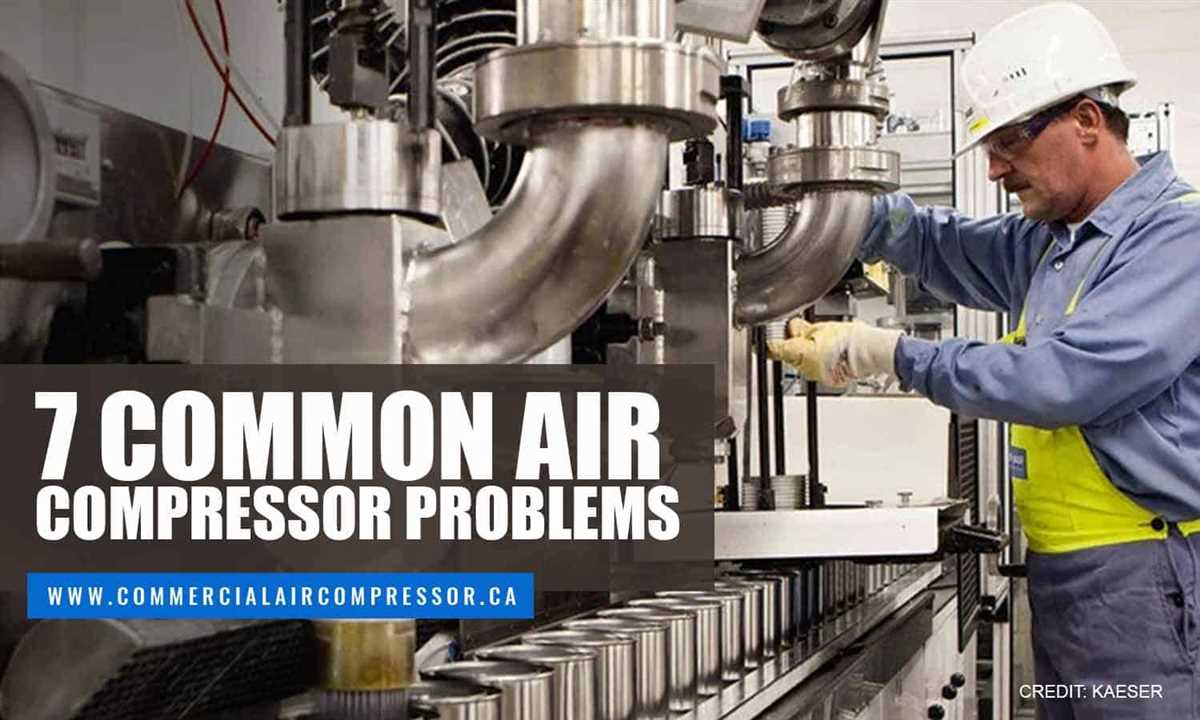
One common reason why your air compressor may have stopped working is due to power supply issues.
If your compressor is not receiving power, it will not be able to function properly. This can be caused by a variety of factors, such as a blown fuse or tripped circuit breaker.
It is important to check the power supply to your air compressor before assuming that there is a more serious problem. Start by checking the power cord for any visible damage, such as fraying or cuts. If there is any damage, it may be necessary to replace the cord.
Next, check the outlet that the air compressor is plugged into. Make sure that it is receiving power by plugging in another device, such as a lamp or phone charger. If the outlet is not providing power, it may be necessary to reset the circuit breaker or replace the fuse.
Additionally, it is important to ensure that the air compressor is receiving the correct voltage. Check the owner’s manual for the recommended voltage and make sure that it matches the voltage of the power supply. If the voltage is incorrect, it may be necessary to use a voltage regulator or contact a professional electrician to make the necessary adjustments.
Faulty Pressure Switch
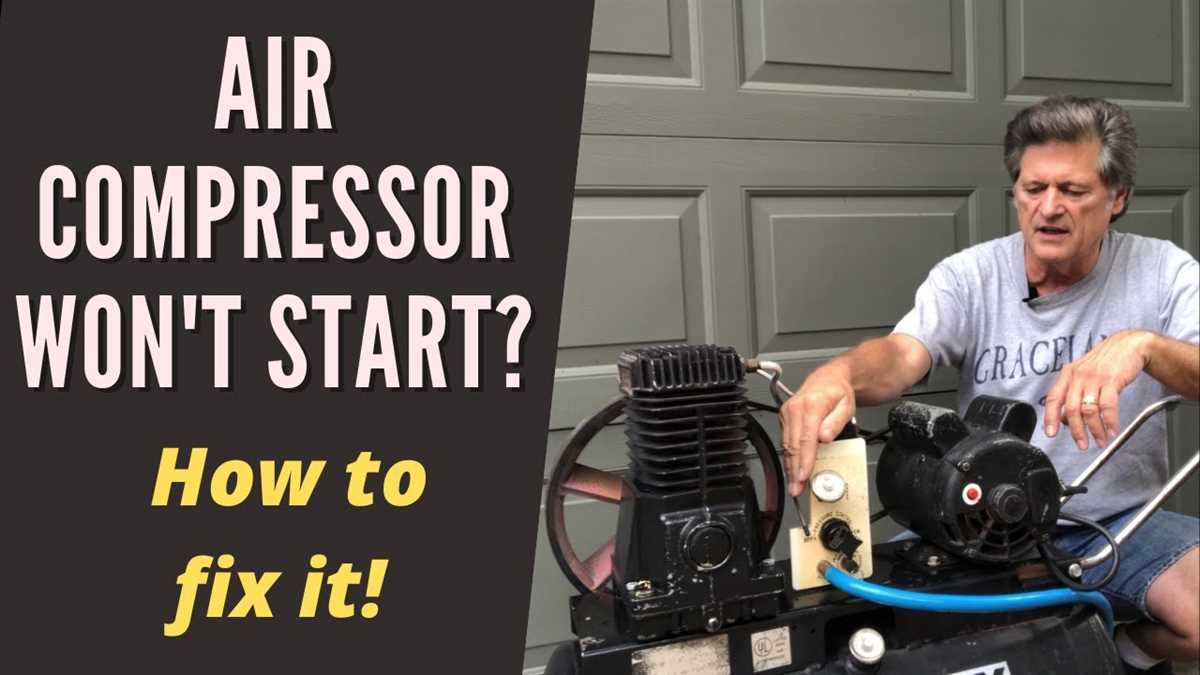
A faulty pressure switch is one of the common issues that can cause your air compressor to stop working. The pressure switch is responsible for regulating the pressure levels in the compressor and turning it on or off as needed. If the pressure switch is faulty, it may not sense the correct pressure levels, leading to incorrect operation.
Signs of a faulty pressure switch:
- The compressor does not turn on or off when it should.
- The pressure does not reach the desired level.
- The compressor runs continuously without shutting off.
If you suspect a faulty pressure switch, it is important to have it inspected and replaced if necessary. A professional technician can test the pressure switch and determine if it needs to be repaired or replaced.
Causes of a faulty pressure switch:
- Wear and tear over time.
- Accumulation of dirt or debris on the switch.
- Electrical issues, such as loose connections or faulty wiring.
Regular maintenance and cleaning can help prevent issues with the pressure switch. It is also important to ensure proper wiring and connections to avoid electrical problems that can affect the switch’s functionality.
Conclusion:
A faulty pressure switch can cause your air compressor to stop working properly. If you notice any signs of a faulty pressure switch, it is important to have it inspected and repaired or replaced by a professional technician.

Clogged Air Filter
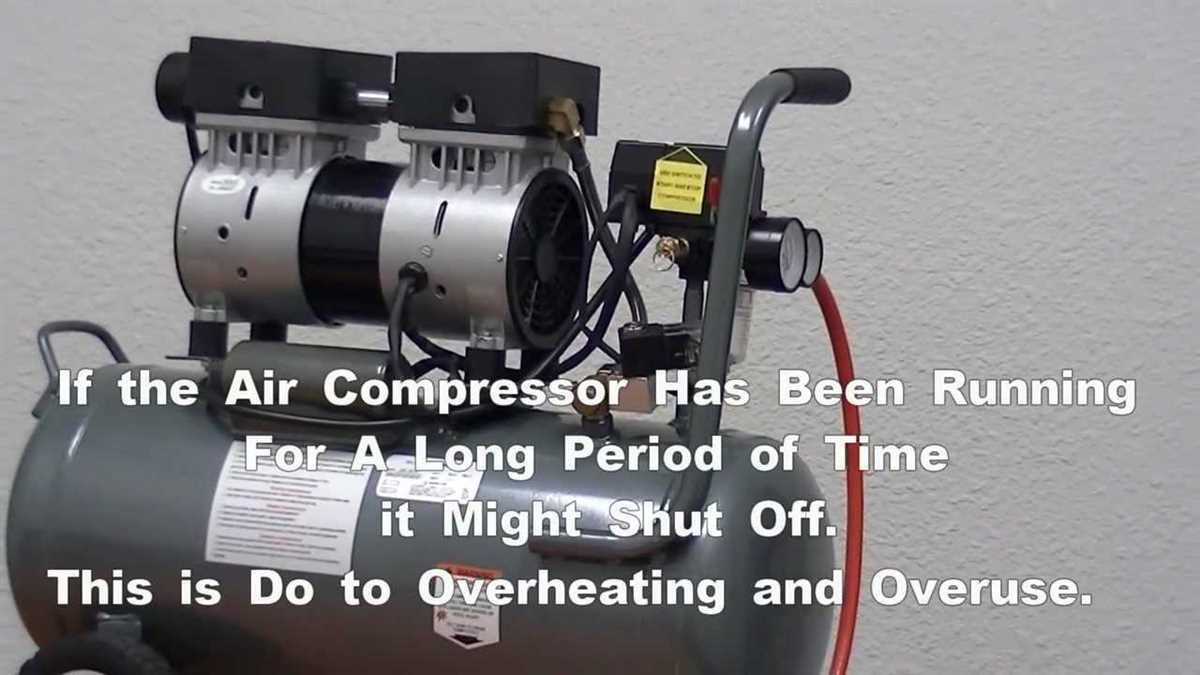
An air compressor relies on a clean air supply to operate efficiently. One common reason why an air compressor may stop working is a clogged air filter. The air filter is designed to catch dust, dirt, and other particles from entering the compressor’s intake. Over time, these particles can accumulate and restrict the airflow, causing the compressor to overheat and shut down.
A clogged air filter can be easily identified by its dirty appearance. It may also cause the compressor to make unusual noises or run at a slower speed. To fix this issue, the air filter should be cleaned or replaced regularly, depending on the manufacturer’s recommendations. Cleaning the air filter involves removing it from the compressor, gently tapping it to dislodge any debris, and using compressed air or a vacuum cleaner to remove stubborn dirt.
If cleaning the air filter does not solve the problem, it may be necessary to replace it. Air filters are relatively inexpensive and can be found at most hardware stores or online. When replacing the air filter, it is important to choose one that is compatible with the make and model of the air compressor. Following the manufacturer’s instructions, the new filter should be properly installed to ensure optimal performance and prevent future clogs.
Leaking Air Lines
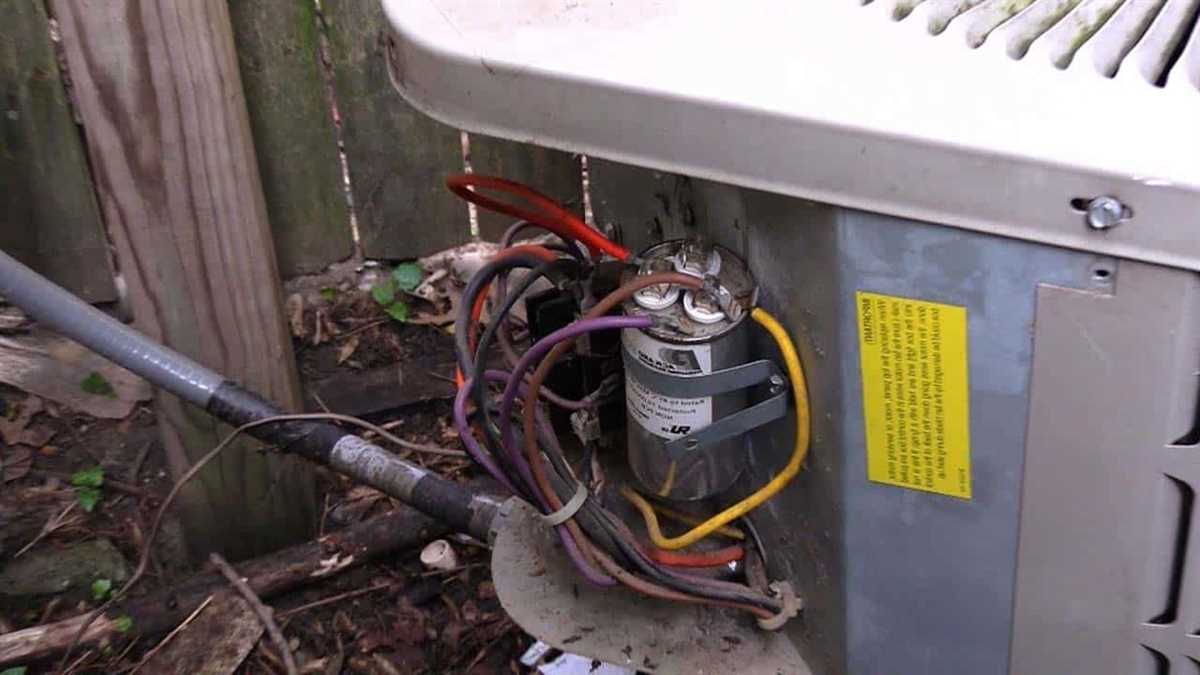

One common reason why your air compressor may stop working is due to leaking air lines. Air lines are responsible for carrying compressed air from the compressor to various tools and equipment. If there is a leak in the air lines, it can result in a loss of air pressure and cause the compressor to stop working effectively.
Leaking air lines can occur due to wear and tear over time or from a faulty connection. The constant movement of the air lines can cause them to develop small holes or cracks, allowing air to escape. Additionally, if the connections between the air lines and the compressor or tools are not secure, air can also leak out.
It is important to regularly inspect the air lines for any signs of leakage. Look for visible cracks, holes, or loose fittings. If you notice any issues, it is crucial to repair or replace the affected air lines as soon as possible to prevent further damage to the compressor and ensure proper functioning.
When dealing with leaking air lines, there are a few steps you can take to address the problem. First, identify the source of the leak by listening for any hissing sounds or feeling for air escaping. Once the source is located, turn off the compressor and release any remaining pressure. Then, you can proceed with repairing the leak by either repairing the damaged portion of the air line or replacing it entirely if necessary. It is important to use the correct tools and materials for the repair to ensure a proper seal and prevent further leakage.
To prevent future issues with leaking air lines, it is recommended to regularly inspect and maintain the air compressor and its components. This includes checking for any signs of wear and tear, ensuring secure connections, and taking necessary precautions such as using thread sealant on fittings. Regular maintenance will help prolong the lifespan of the air compressor and prevent unexpected breakdowns.
Malfunctioning Motor
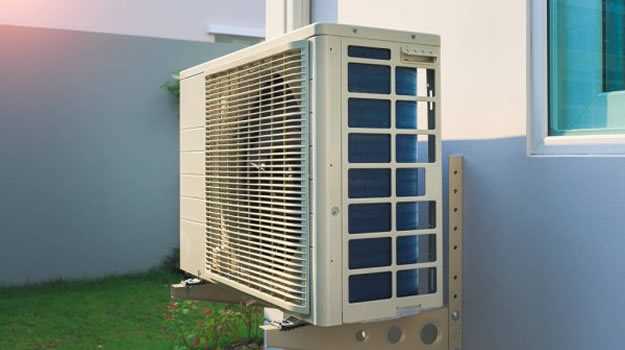
If your air compressor has stopped working, one of the common reasons could be a malfunctioning motor. The motor is a critical component of the air compressor as it provides the power necessary to generate compressed air. There are several issues that can cause a motor to malfunction.
One possible cause is overheating. An air compressor motor can overheat due to prolonged use or insufficient cooling. This can happen if the motor is running at a high load for an extended period of time or if the cooling mechanisms, such as the fan or vents, are blocked or damaged. When the motor overheats, it can trigger a thermal overload switch that shuts off the power to prevent further damage.
Another cause of a malfunctioning motor can be electrical problems. This can include issues with the wiring or connections, such as loose or corroded wires, short circuits, or faulty switches. These electrical problems can prevent the motor from receiving the necessary power to operate properly.
In some cases, the motor itself may be faulty or worn out. This can occur due to age, wear and tear, or manufacturing defects. If the motor is not functioning correctly, it may not be able to start, run, or maintain the required power for the air compressor to operate.
To troubleshoot a malfunctioning motor, it is recommended to first check the power supply and connections to ensure they are secure and functioning correctly. If the electrical components are in good condition, it may be necessary to inspect the motor for any signs of overheating, such as a burning smell or discolored wiring. If any issues are detected, it is best to consult a professional for further diagnosis and repair.
Low Oil Level
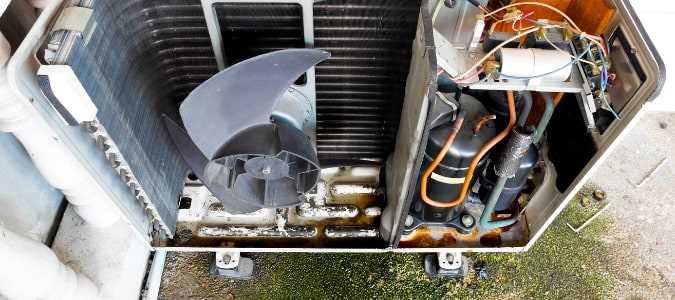
One common reason why your air compressor may have stopped working is due to a low oil level. The oil in your compressor plays a crucial role in lubricating the moving parts and reducing friction. Without enough oil, the internal components can become damaged and lead to the compressor malfunctioning.
If you notice that your compressor is not functioning properly, it’s important to check the oil level. To do this, refer to the manufacturer’s instructions on how to access and check the oil level. If the oil level is low, you will need to add more oil to the compressor. Be sure to use the recommended type and amount of oil specified in the manufacturer’s guidelines.
Regularly checking and maintaining the oil level in your air compressor is crucial to its overall performance and longevity. It’s recommended to check the oil level before each use or at least once a month, especially if you use the compressor frequently. Additionally, be sure to change the oil according to the manufacturer’s recommended intervals to ensure optimal performance.
In some cases, a low oil level could be a sign of an underlying issue with the compressor, such as a leak or a malfunctioning oil pump. If you continue to experience problems with a low oil level even after adding oil, it’s best to consult a professional technician who can diagnose and fix the issue.
Overheating
If your air compressor has stopped working, one possible reason could be overheating. Overheating can occur when the compressor is running for extended periods of time or when the ambient temperature is too high. When a compressor overheats, it may automatically shut off to protect itself from damage.
Causes of overheating:
- Insufficient lubrication: Lack of proper lubrication can cause increased friction and heat buildup in the compressor.
- Dirty air filters: Dirty filters restrict airflow, causing the compressor to work harder and generate more heat.
- Blocked cooling fins: If the cooling fins are clogged with dust or debris, the compressor will struggle to dissipate heat effectively.
- Malfunctioning fan: If the fan that helps cool the compressor is not working properly, it can result in overheating.
Signs of overheating:
- Compressor shuts off unexpectedly
- Burning smell
- Abnormal noise
- Hot exterior surface
- Inconsistent or weak airflow
To prevent overheating, it is important to regularly maintain your air compressor. This includes:
- Checking and replacing lubricating oil as needed
- Cleaning or replacing air filters regularly
- Cleaning the cooling fins to ensure proper airflow
- Ensuring the fan is functioning properly
- Allowing the compressor to cool down between extended periods of use
If your air compressor continues to overheat despite proper maintenance, it is recommended to consult a professional technician to identify and resolve the underlying issue.
Worn-out Pistons or Rings
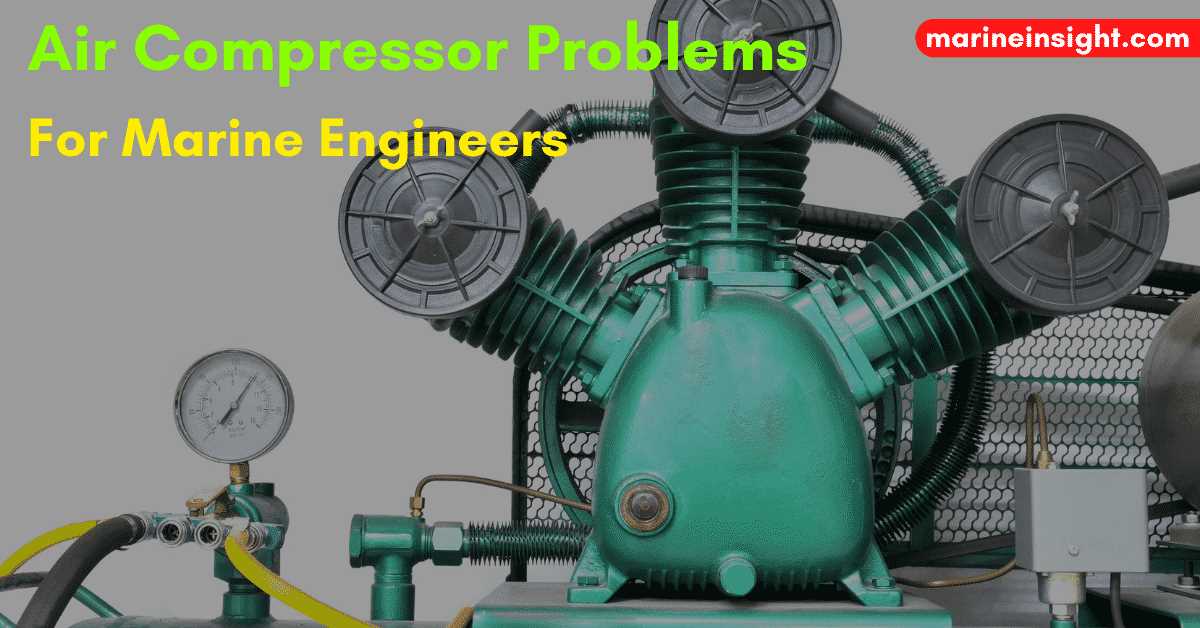
If your air compressor has stopped working, one possible cause could be worn-out pistons or rings. The pistons and rings play a crucial role in the operation of the compressor by creating compression and maintaining pressure. Over time, the constant friction and heat can cause these components to become worn-out or even damaged.
A worn-out piston or ring can result in several issues. First, it can lead to a drop in the compression efficiency, causing the compressor to struggle to generate enough pressure. This can result in reduced air output or even complete failure of the compressor.
Additionally, worn-out pistons or rings can cause excessive oil consumption in oil-lubricated compressors. The gaps between the piston and cylinder wall that develop due to wear can allow oil to pass through, resulting in increased oil usage and potential fouling of the compressed air.
To prevent or address this issue, regular maintenance and inspection of the pistons and rings are essential. This may include checking for signs of wear or damage, ensuring proper lubrication, and replacing worn-out components when necessary. It is also important to use high-quality lubricants and follow the manufacturer’s guidelines for maintenance and usage.
FAQ:
Why is my air compressor not turning on?
There can be several reasons why your air compressor is not turning on. It could be due to a blown fuse or tripped circuit breaker, a malfunctioning pressure switch, a faulty motor, or a problem with the power supply.
What should I do if my air compressor is not producing enough pressure?
If your air compressor is not producing enough pressure, you should first check the pressure switch to ensure it is set correctly. Additionally, check for any leaks in the system, inspect the air filter to see if it needs cleaning or replacement, and make sure the compressor’s tank is not overfilled.
Why does my air compressor shut off on its own?
There are a few possible reasons why your air compressor shuts off on its own. It could be due to an overheating motor, a malfunctioning pressure switch, a faulty check valve, or low oil level. It is important to investigate the cause of the automatic shutdown to prevent any further damage to the compressor.
Can a clogged air filter cause my air compressor to stop working?
Yes, a clogged air filter can cause your air compressor to stop working. A dirty or clogged air filter reduces the airflow, which can lead to overheating of the compressor and ultimately result in its shutdown. Regularly cleaning or replacing the air filter can help prevent this issue.
What should I do if my air compressor is making strange noises?
If your air compressor is making strange noises, it could indicate a problem. You should first check for any loose or damaged parts, such as belts or pulleys. Lubricating moving parts and ensuring proper alignment might also help eliminate the noise. If the problem persists, it is advisable to consult a professional for further diagnosis and repair.
Why is my air compressor leaking air?
There are a few possible reasons why your air compressor is leaking air. It could be due to a cracked or worn-out hose, a faulty pressure relief valve, a broken gasket or seal, or a loose connection. Inspecting the compressor and addressing any leaks promptly can help maintain its performance and prevent further damage.
Video:









